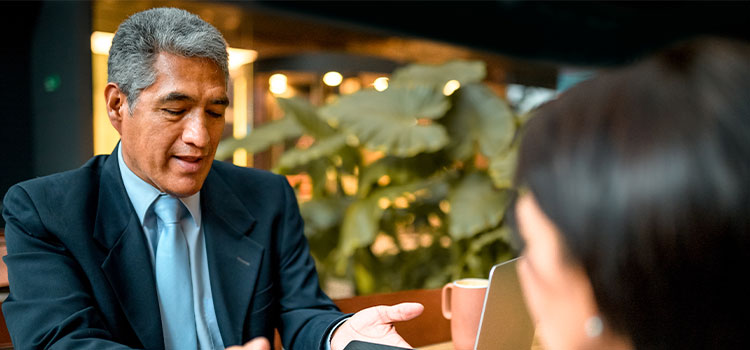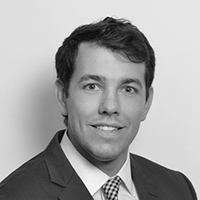In this Article
Learn How to Become a Forensic Accountant

Forensic Accounting Career Snapshot
What Is Forensic Accounting?
Forensic accountants examine and track the finances of businesses and individuals. Businesses or government investigators may hire them when they suspect a financial crime such as bribery, embezzlement, or money laundering. Forensic accountants may also monitor a business' accounting and bookkeeping practices to prevent financial wrongdoing. Many industries rely on these accounting specialists, making this a coveted career.
9 Steps to Becoming a Forensic Accountant
The following steps can help you pursue a career in forensic accounting.
Find the right school.

You'll want to consider several factors when deciding if a school is right for your career path.
• Accreditation: An accredited school has met standards for delivering a quality education that will prepare students for roles in their field. Employers may look for applicants who have earned their undergraduate degrees from accredited schools.
• Relevant coursework: If you're planning to become a forensic accountant, you'll want to make sure that a school's accounting program includes a forensic concentration or at least coursework in this area. These studies can also help you secure an internship to gain experience before you hit the job market.
• Online Programs: If you'll be balancing school with work, or you have family responsibilities and need a flexible schedule, an online program might be right for you. Online programs can give you access to a program that isn't nearby and also allow you to learn at your convenience by listening to prerecorded lectures and classes.
Choose a degree.

You'll need at least a bachelor's degree to become a forensic accountant. You can start with a two-year associate degree, however, and pursue your bachelor's degree later while you work.
If you pursue a bachelor's degree, you'll find several degrees to choose from. Schools typically offer a bachelor of arts (BA) in accounting, a bachelor of science (BS) in accounting, or a Bachelor of Accountancy (BAcc). These programs cover much of the same material, but you'll want to look for forensic coursework.
Apply to a school and gain admission.

You'll need a high school diploma or GED to apply to a college program. Beyond that, requirements will vary by school and program. They may require all or some of the following:
• Minimum high school GPA. This generally varies from 2.0 to 3.0 or higher, depending on the school and how competitive the program is.
• Coursework. An accounting program may require applicants to have already taken basic algebra, geometry, and calculus.
• College test scores. Some schools or programs require applicants to submit SAT or ACT scores.
Earn your degree.

Your degree will give you a solid understanding of accounting and the foundation to build your specialty. Expect a mix of business courses with a focus on accounting:
• Accounting: Learn to evaluate complex financial statements and report results.
• Auditing principles: Understand the ethical standards of auditing.
• Auditing and forensic accounting: Learn how to recognize and investigate financial crimes.
• Interview techniques: Examine the principles of conducting interviews during the prosecution of fraud.
• Business law: Explore business operations and regulation.
• Business valuation: Learn the tools and techniques to analyze the value of publicly traded companies.
• Federal taxation: Explore federal tax laws and Internal Revenue Service codes and learn how they relate to tax liabilities.
• Cost accounting: Learn concepts used to analyze how much it costs a business to produce goods and deliver services.
It's also helpful to complete an internship so you can gain experience and network to make contacts within the industry. An internship is a great addition to a resume and can help you to stand out from other candidates when applying for a job.
"Real-world experience is critical to anyone going into all types of accounting fields," says Nathan Hein, managing director of Forensic & Litigation Consulting. "Because the number of internship opportunities for forensic accountants can be somewhat limited, I often recommend trying to expand a search to also include internships in either internal or external audit. These internships will help teach someone how to test/audit account balances, as well as help provide a strong foundation on how to analyze a company's books and records from an accounting perspective. If you are looking for an enforcement role in a specific industry or area, such as an investigator at the IRS, a tax internship could also be helpful—it all depends on what type of role someone is looking for."
Land your first job.

You can take several steps that could make it easier to find your first position. Attending job fairs and using networking sites like LinkedIn can help you connect with managers and HR professionals and find job leads. Circle back to contacts you made during your internship and let them know that you're graduating and launching your career. There may be open positions at the firm where you interned or your contacts may be able to tip you off to a position elsewhere.
Gain experience.

You will likely need a year or two of general accounting experience before you'll be prepared to specialize in forensic accounting. "I'd recommend starting in external audit—that's where I, and many other forensic accountants, started their careers," says Hein. "These roles help teach an individual how to understand and analyze a company's books and records. These skills are critical for forensic accountants."
Consider CPA certification.

While you don't necessarily need a certification to work as a forensic accountant, some employers may hire only certified public accountants (CPAs). This means a CPA credential can make you a more competitive applicant—and help you earn higher salaries throughout your career.
"There are many certifications that can help with advancement, such as the CPA," says Hein. "Once obtaining a CPA, individuals can become members of the American Institute of CPAs (AICPA), which has several additional certifications specific to forensic accounting, such as the CFF (Certified in Financial Forensics) and ABV (Accredited in Business Valuation) that professionals can obtain."
One of the requirements to become a CPA is 150 credits, which is more than the standard 120 credits you'll earn with a bachelor's degree. You can usually earn the extra 30 credits in a master's degree program.
You don't need to put your career on hold to go back to school, though. It's common to earn a master's degree while working, and an online program can give you the flexibility you may need to manage work and school.
If you don't want to go to graduate school, you can accumulate the necessary CPA credits by attending classes at a community college.
Consider a specialty certification.

In addition to the CPA, forensic accountants can become certified management accountants (CMAs) or earn credentials that establish them as experts in their specialty. A specialty certification can also make you a more attractive job applicant, increase your chances of advancement, and lead to higher salaries.
Here are two specialty certifications for forensic accountants.
Certified Fraud Examiner
• Who Grants It: Association of Certified Fraud Examiners (ACFE)
• What It Is: The CFE credential demonstrates that you are a trained professional who has specialized skills in investigating and preventing fraud.
• Who It's For: Anti-fraud professionals all over the world
• Requirements: A minimum of two years of fraud-related work
• Exam and Prep: The CFE exam consists of 400 multiple-choice questions divided into four two-hour parts. You don't have to complete the test in one sitting. You can take a fee-based prep course or study on your own using the Fraud Examiners Manual.
Certified Financial Forensics
• Who Grants It: American Institute of Certified Public Accountants
• What It Is: A certification that positions forensic accountants as experts in their field.
• Who It's For: CPAs who want to demonstrate expertise in forensic accounting
• Requirements: CPA and at least two years of professional experience
• Exam and Prep: The computer-based exam consists of multiple-choice questions. It's divided into two parts, with two hours for each section. You can use the CFF Content Specification Outline to study or take a fee-based prep course.
Advance your training and career.

As with certifications, further training or education can advance your career. If you want to pursue director, executive, or leadership roles, consider pursuing a master's degree in accounting or a Master of Business Administration (MBA) in accounting.
A master's in accounting will go deeper into accounting, while an MBA will give you a broad understanding of all aspects of business and prepare you for managerial roles in accounting or other fields such as business administration or finance.
Is a Forensic Accounting Job Right for You?
Forensic accountants have specialized knowledge and investigative skills. Businesses hire them to analyze and track financial matters, many times to look for suspicious financial activity or to prevent fraud. If they find financial wrongdoing such as money laundering or embezzlement, forensic accountants may work with law enforcement and testify at criminal trials.
In addition, they may be hired in estate or divorce cases to resolve financial disputes or track money.
Common tasks include:
Forensic accountants use investigative skills to analyze and track the finances of businesses or individuals when financial wrongdoing like money laundering or fraud is suspected.
What It Takes to Be a Forensic Accountant
Forensic accountants need to have certain qualities and skills to excel. Critical thinking and a mastery of detail go hand in hand in this profession. Here are some other valuable traits and skills:
Communication skills: They must be able to effectively communicate with multiple audiences, including people who might not be familiar with accounting.
Problem-solving talents: Forensic accountants need to be creative and able to solve the problems they identify in their work.
Information technology skills: There are multiple accounting software programs and other technology, and forensic accountants should be comfortable using all of them.
Commitment to work: "A strong work ethic is also required, as many matters are a high priority to our clients and often need to be responded to immediately," says Hein.
How Long Does It Take to Become a Forensic Accountant?
Based on your education path and career goals, six to eight years.
It typically takes four years to complete a bachelor's degree if you go to school full time. You'll also need a few years of general experience before moving into a forensic accountant role. If you pursue a master's degree, you'll spend two more years in school, but there's an upside because many professionals work while they pursue a graduate degree and there are online programs that allow you to juggle responsibilities.
Where Do Forensic Accountants Work?
Forensic accountants often work in major metropolitan areas, where businesses and industry are typically concentrated. They may work for large enterprises, accounting firms, or consulting firms.
"There are numerous consulting firms that hire forensic accountants as part of their litigation consulting departments," says Hein.
"Additionally, many forensic accountants are hired by government enforcement agencies such as the FBI, IRS, USPS, DEA, and ATF."
Forensic Accountant Salary & Job Outlook
According to the U.S. Bureau of Labor Statistics (BLS), job opportunities for accountants and auditors are expected to grow by 4.4% through 2032. The BLS doesn't give projections by accounting specialty, but Hein says there is notable growth in the forensic accounting industry.
The BLS reports that the median annual salary for accountants and auditors in general is $79,880. The top 10% earn more than $137,280, while the lowest 10% earn less than $50,440.
Keep in mind that earning a certification or pursuing a master's degree may boost your salary. Your salary can also be influenced by:
Here's a look at the top 10 metro areas where accountants earn the most.
Professional Resources
Professional resources offer value as you learn about the field and throughout your career. These resources can help you to stay on top of trends in forensic accounting and advance your professional goals.
The National Association of Forensic Accountants provides training and certification across multiple forensic accounting fields. As a member, you'll also receive newsletters about trends and other topics.
The Association of Certified Fraud Examiners has a job board and a career center where you can find new opportunities. It also publishes Fraud Magazine and hosts free webinars about fighting fraud.
The American Board of Forensic Accounting offers mentoring, continuing professional education credits, conference networking, and referral opportunities to its members.
The Institute of Certified Forensic Accountants offers a variety of courses and forensic accounting publications on its site.
There are also forensic accounting podcasts that cover fraud and forensic accounting topics.


